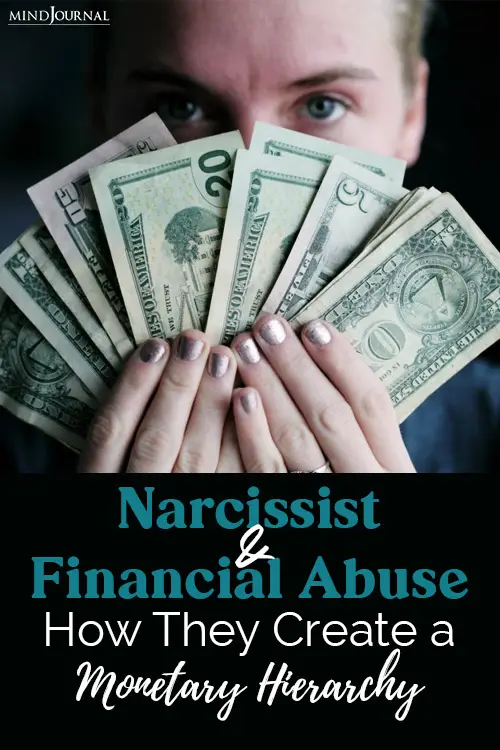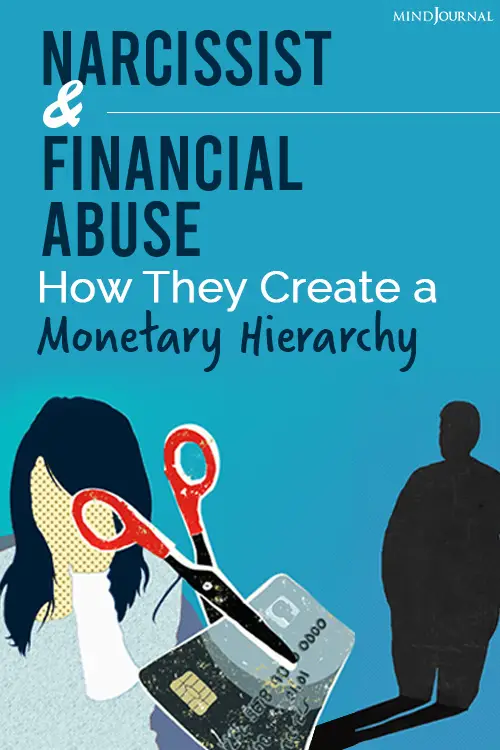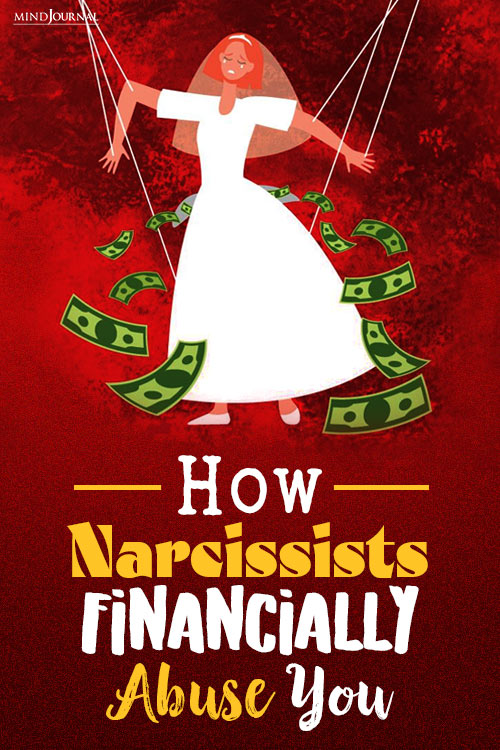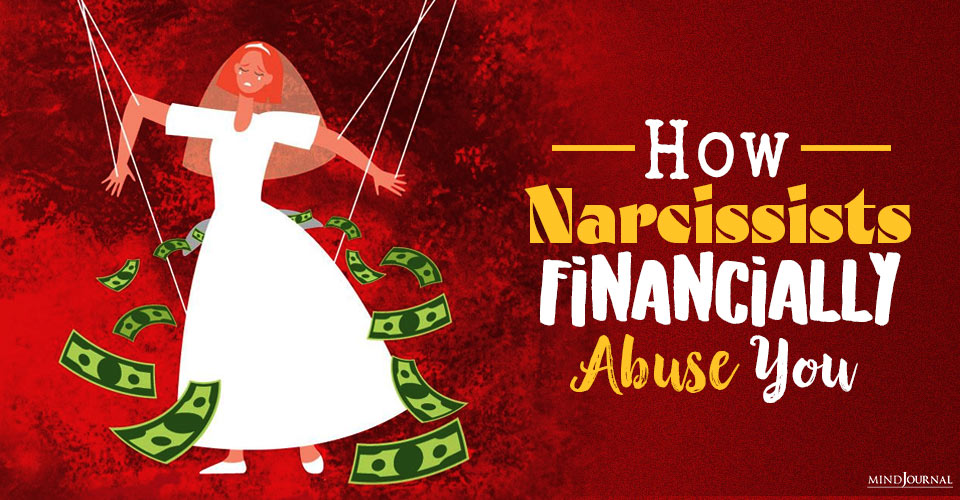Narcissistic control extends to finances and creates a monetary hierarchy. Narcissist financial abuse is yet another way for narcissists to torment their victims more, and control them. There are many ways narcissists use money to control their victims. Most of the time, their victims don’t even realize that they are being financially abused until it’s too late.
Key Points:
- Narcissists tend to focus on extrinsic motivators, like money and rewards, rather than personal growth and fulfillment.
- Because money and material wealth are highly important to narcissists, they often become a focal point of their relationships—sometimes resulting in financial abuse.
- Some forms of financial abuse, like lying about pay or hours worked, can be covert or hard to detect; others (like controlling a partner’s spending) are more obvious.
- Anyone who is a victim of financial abuse should seek help immediately.
It could be said that money—not love—is what makes the world go round. Money is what keeps us clothed and fed and ensures a roof over our heads and gas in our vehicles. It allows us to go on vacations and sip coffee while shopping for both necessities and frivolities. Money can also be a major source of stress when bills are due, the furnace breaks, or we lose a steady paycheck.
Modern capitalist culture enforces the power of the almighty dollar by equating good with rich and prosperous (Werner, Smyth, & Milyavskaya, 2019). For narcissists, not only is this prosperity a non-negotiable, but it is another method of control and superiority in a relationship.
Related: 7 Myths About Narcissistic Abuse That Need To Be Dismissed Now
Money As Motivation
Money is an example of an extrinsic, or external, goal and motivator. Whereas non-narcissistic people aim to find meaning and personal fulfillment in a job as well as a good wage, narcissists are lacking that inner drive. Keep in mind that with a narcissist, wealth and prosperity are often inflated—much like their ego.
Obsession with money or other external goals—such as a higher job title at work or a better car or a bigger house—is not always a good thing. Studies have shown that preoccupation with external goals can be detrimental to physical and mental health (Werner et al, 2019). It is perfectly normal to want to upgrade your phone or work towards a promotion, but there must also be an inner desire for personal growth and improvement.
For example, a nontoxic, non-narcissistic individual may seek out additional opportunities to improve their chances of promotion and increase their knowledge. They have intrinsic motivators driving them toward their goals—perhaps a natural curiosity, enjoyment of a sport or a topic of study, or spending time with someone for their friendship.
A narcissist, however, will enroll in a program to impress other people, join a team strictly to win a prize, or befriend someone to increase their chances of gaining popularity or favor.
The more a person invests in internal goals and motivators, their penchant for negative and destructive behaviors decreases (Werner et al, 2019). The focus becomes one of growth, expansion, and positivity.
Heavier focus on external motivators and goals will increase a person’s bad behavior: cheating on company records or licensing exams, dabbling in drug and alcohol use, or engaging in affairs and neglecting one’s family.
A narcissist’s inflated and undeserved ego leads them to believe they are worth more than they are and that they deserve the affair, the higher pay, the better exam score. There is a positive correlation between narcissists and their reliance on external goals and motivations (Werner et al, 2019).
Narcissists and those with the same toxic traits are naturally attracted to empathetic people with low or no boundaries. These nontoxic individuals are the same ones that rely on internal motivators to reach their goals.
Money may be important to them, but it is not the end-all. These people place emphasis on personal fulfillment, family, honesty, and fairness… and unfortunately find themselves in relationships with narcissists.

Narcissist Financial Abuse: Forms of Financial Abuse
Financial abuse can take many forms. It can affect a property, assets, personal belongings, bank accounts, investments, job sites, and even schooling and housing needs. The most basic form of financial abuse is that of controlling paychecks or the amount shown.
Ava recalls how during her 10-year marriage, her husband would hide bills and receipts and would even lie about overtime and paychecks. “He would claim he was working extra shifts, but the paystubs never reflected that. He would then say the payroll department screwed up, but that would be the end of it.”
Izzie recalls when she was dating her former partner, she was forced to deposit her entire paycheck into a joint account, but then she was never able to make any withdrawals. “I couldn’t drive due to medical issues, so when I needed a lift, he would charge me.” Not only was Izzie dependent on her boyfriend for transportation, but her financial freedom was also his to control.
Narcissists also have no misgivings or regret over destroying another person’s property. In fact, ruining personal items makes the narcissist feel powerful. They have no qualms about throwing out someone’s childhood mementos, photos, and albums that are irreplaceable, or causing hundreds of dollars in repairs to a laptop smashed in a fit of jealousy. A narcissist will never offer to pay for or replace what they destroyed and instead attempt to shame you for forcing them to act as they did.
Another way of exercising financial abuse is refusing to contribute to shared expenses, repairs, or utilities. The burden of paying the mortgage or rent, coming up with the money to replace a hole in the kitchen floor, or even funding a family vacation will fall to just one partner in a relationship: the non-narcissist.
This same narcissist will also most likely have a secret bank account and shame the other partner for their spending habits. A more covert way of being financially abused is not being allowed to flourish professionally or academically. Talking a partner out of a promotion or a degree program is a selfish and controlling move and ensures that the narcissist stays in control.
Related: What is Narcissistic Abuse: 16 Signs To Identify And How To Protect
Narcissists And Material Wealth
Narcissists are overly preoccupied with material possessions and wealth. It becomes about the show and not about the substance. Narcissists will feel the need to brag about their possessions and apparent wealth and use these things to win people over.
They may brag about their paychecks and titles (“I am making $50 an hour and I am in charge, you aren’t as important as I am!”) cars, or houses (“My house is bigger and my car is cleaner than yours!”) but then refuse to pay their half of a bill or expect financial compensation for a favor.
Narcissists are also known to lie or cover up their bank statements in legal situations to get more money in alimony or child support. People become pawns—even the lawyers and judges—and child support becomes more about financially ruining the ex-partner than caring for the children of the relationship.
Other people—even those they profess to love—may become simply dollar signs. Many narcissists are unable to have true relationships with other people. Friends, lovers, children, and even parents are just a means to an end. What the narcissist can get from someone else is the paramount purpose of the relationship.
When money is involved, it creates another method of control and hierarchy. Hiding money, lying about paychecks, stealing from others, and refusing to help someone in financial distress make the narcissist powerful and in charge. All relationships are a game devoid of love and true meaning beyond fulfilling the narcissist.
References:
Werner, K. M., Smyth, A., & Milyavaskaya, M. (2019). Do narcissists benefit from materialistic pursuits? Examining the relation between narcissistic tendencies, extrinsic goals, and well-being. Collabra: Psychology 5(1), 58. https://doi.org/10.1525/collabra.253
Written By Kristy Lee Hochenberger Originally Appeared In Psychology Today

















Leave a Reply
You must be logged in to post a comment.